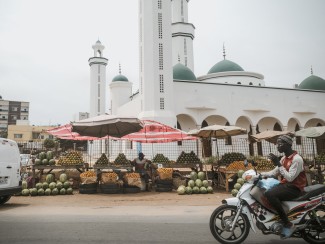Teaching small businesses how to swim in small ecommerce pools prepares them for the profitable but shark-infested and highly competitive high seas of global trade.
The coronavirus pandemic shut many business doors across the world, but it also opened windows to new digital possibilities, including ecommerce. A study by UNCTAD found that ecommerce’s share of global retail trade rose from 14 percent in 2019 to about 17 percent in 2020.
Emerging markets saw the biggest shifts. Latin America’s online marketplace, Mercado Libre, doubled sales in the second quarter of 2020 compared to the previous year, while Jumia, an ecommerce platform in Africa, saw a 50 percent rise in sales in the first half of the year.
However, the report found that businesses and producers in many developing countries have not done enough to take advantage of this shift to ecommerce. They are held back by, among others, poor internet access, an overreliance on cash, a lack of consumer trust, low digital knowledge and skills, and failure by governments to prioritize ecommerce.
Setting up a swimming pool
An initiative in Cambodia is showing how least developed countries (LDCs) can address these challenges and plug into the global ecommerce trade. Started in July 2020, the Cambodia eCommerce Project, Go4eCAM, set out to increase economic opportunities for small, medium and micro enterprises to participate in ecommerce and the digital economy.
At the heart of the project is a national ecommerce platform, CambodiaTrade. “It isn’t the first ecommerce platform in Cambodia,” says Ambassador Long Kemvichet, the country’s envoy to the World Trade Organization, “but it is the first of its kind because it primarily focuses on business-to-business, and targets promoting cross-border trade.”
If global ecommerce trade is the open sea, CambodiaTrade is a swimming pool in which the country’s micro-, small-, and medium-size enterprises (MSMEs) are taught how to swim. The first step was building the swimming pool itself. The platform has integrated local banks and fintech firms to provide payment solutions and ease ways in which merchants can take and make cross-border payments.
Another barrier stopping MSMEs in LDCs from making the transition from offline to online is logistics and an ecosystem that allows one-click shopping, says Mr. Laichea Chea, a director of International Cooperation in Cambodia’s Ministry of Commerce.
To address this, the project has worked with Cambodia Post and DHL Cambodia to upgrade the postal IT infrastructure. The postal service has become 25 percent readier for ecommerce by increasing effectiveness of order fulfilment and deliveries, as well as reducing the impact on the environment.
The postal and delivery system has also been integrated into the ASYCUDA World tax-management portal and is being interfaced with UPU Customs Declaration System which, Mr. Chea says, will ease the sale and shipping of smaller packages.
Part of the work was to standardize key documents such as privacy policies as well as terms and conditions so that all buyers and sellers have a shared understanding of the rules. As many of these ecommerce rules are new, a regulatory sandbox was built to draft and test them and set standards.
Getting swimmers into the shallow end
With the pool built and filled with water, the next step was to identify the swimmers and get them into the shallow end. This was done in two ways. The first was an incubation program, in which MSMEs were trained in cross-border access to e-markets, business-critical thinking, business operations and finance, among others.
The other was an innovation challenge which, with the support of partners including UNDP Cambodia and Khmer Enterprise, gave small grants of between $4,000 - $5,000 to carefully selected small businesses to improve their ecommerce prospects.
“Many small businesses do social commerce through Facebook Marketplace, TikTok and others,” says Mr. Chea. “We help them, through the incubation program and the innovation challenge, to develop into proper ecommerce players.”
The swimmers are starting to perfect their strokes. Out of 350 applicants, more than 90 MSMEs have been onboarded to the CambodiaTrade platform, creating 2,000 jobs. Half of these enterprises are female-owned, and 44 percent are based in rural parts of the country. Collectively, there are now at least 550 ‘Made in Cambodia’ products listed on the platform which will officially launch later this year and targets annual sales of at least $2 million.
MSMEs joining the platform are free to list on others run by the private sector, and the long-term plan is to privatize CambodiaTrade. But the importance of government support in making ecommerce a priority in LDCs cannot be overemphasized, Cambodian officials say.
“What the government can do has to be different from what the private sector can do,” Ambassador Kemvichet says. “Each country has to pursue this agenda, of upgrading ecommerce capacity, at the national level. We are not trying to compete with the private sector. We are only trying to bring inclusive benefits to the MSMEs through a non-profit initiative.”
Apart from being better placed to mobilize MSMEs nationally, Ambassador Kemvichet adds that public sector involvement improves confidence of customers seeking to trade with businesses in LDCs.
“If you don’t trust the other party you can’t engage in transactions with them, especially cross-border,” he says. “But in this case, if there is a problem you can always come back to the ministry and have it resolved.”
Ecommerce, sea of opportunity
LDCs have traditionally relied on high-cost, low-impact means of showing off their goods by, for example, hiring booths at trade shows and expos. Ecommerce platforms allow them to exponentially grow the number of products they can show off to potential customers, simplify the selling process, reduce transactional costs, increase trade revenues, and boost economic growth.
As economies become more digitalized, UNCTAD says countries that harness the potential of ecommerce will be better placed to benefit from global markets for their goods and services, while those that fail to do so risk falling behind.
For LDCs standing tentatively at the shores of the ecommerce sea of opportunity, Cambodia offers some lessons on how to prepare small businesses at home in order for them to swim and stay afloat across borders.
Photo by Roth Chanvirak on Unsplash
If you would like to reuse any material published here, please let us know by sending an email to EIF Communications: eifcommunications@wto.org.


